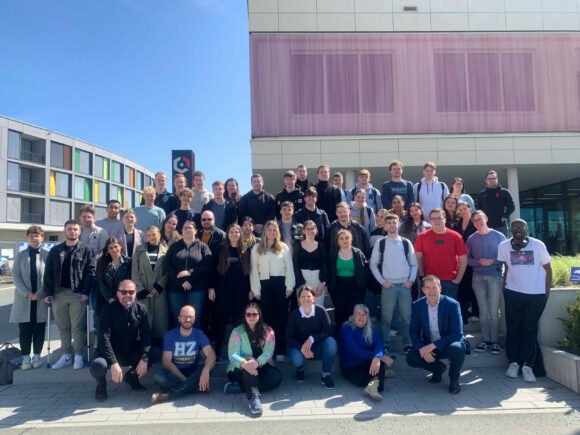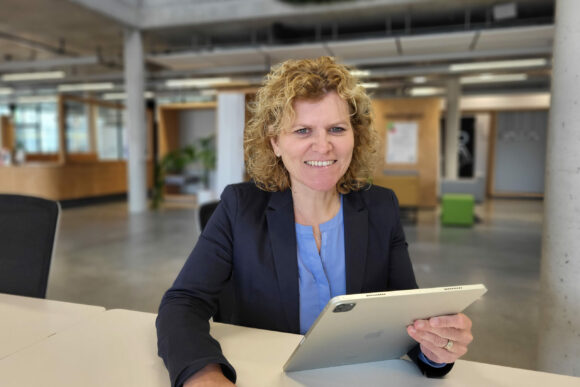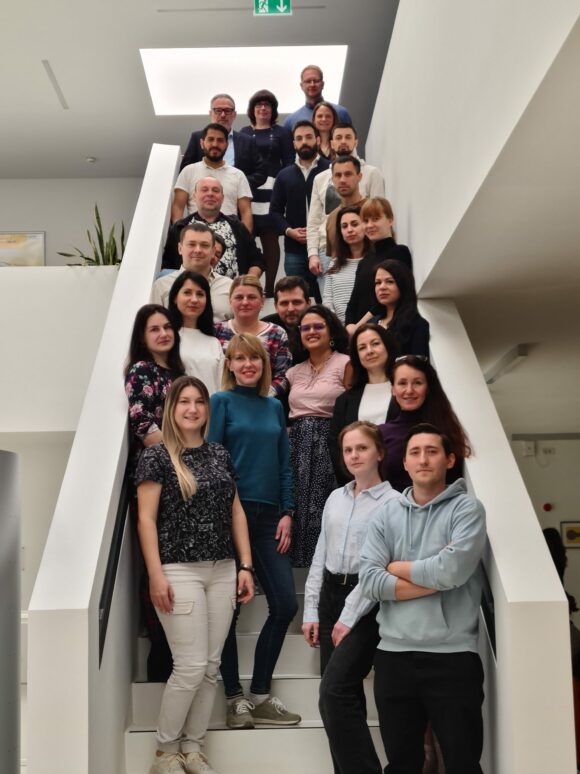Sustainability is also becoming increasingly important in teaching, especially in the context of education for sustainable development. Teaching methods such as simulation games or project-based and collaborative learning are increasingly being used to convey the complexity of sustainability. In this context, the dean, four professors from the Faculty of Engineering and the sustainability manager at Hof University of Applied Sciences held a train-the-trainer course for the “Sustain 2030” simulation game.

Prof. Dr. Manuela Wimmer used the “Sustain 2030” simulation game for the first time as part of the “Environmental Economics & Sustainable Economy” lecture in the Engineering Sciences degree course with a focus on environmental technology.
In this interview, Prof. Dr. Manuela Wimmer, head of the “Sustainable Water Management and Engineering” Master’s degree course and the “Sustainability and Project Management in Water Management” research group at the Institute for Sustainable Water Systems, and Anja Grabmeier, research assistant and sustainability manager at Hof University of Applied Sciences, talk about “Sustain 2030”. Together they took on the role of facilitators (moderators in simulation games) as part of the first-time application.

What are the advantages of a simulation game compared to conventional courses?
Manuela Wimmer: “Simulation games are characterized by the practical communication of complex issues and encourage the active participation of the participants, which leads to a deeper understanding and improved application of the content.”
Simulation games are not uncommon in courses, why would you recommend Sustain 2030?
Manuela Wimmer: “I was impressed by the realism of the events in this game. The game starts in 2020 and the first event you have to react to is a pandemic.”
What was the deciding factor for you to include the simulation game in your “Environmental Economics & Sustainable Economy” lecture?
Manuela Wimmer: “Firstly, it fits in perfectly with the course content and secondly, I’m a fan of mixed methods, also to meet the learning needs of as many students as possible. The simulation game offers experiential learning in a simulation and role-playing situation with debriefing, which hopefully also keeps learning fun and curious (laughs) and encourages curiosity in learning with the simulation game.”
What is the “Sustain 2030” simulation game about?
Manuela Wimmer: “Sustain 2030 is based on the 17 Sustainable Development Goals (SDGs) of the United Nations and the German Sustainable Development Strategy. Based on the Systems Thinking method, “Sustain 2030″ facilitates engagement with the SDGs, strengthens the ability to change perspectives and promotes interdisciplinary collaboration. The focus is on building an understanding of systems, thinking in contexts and developing decision-making skills.”


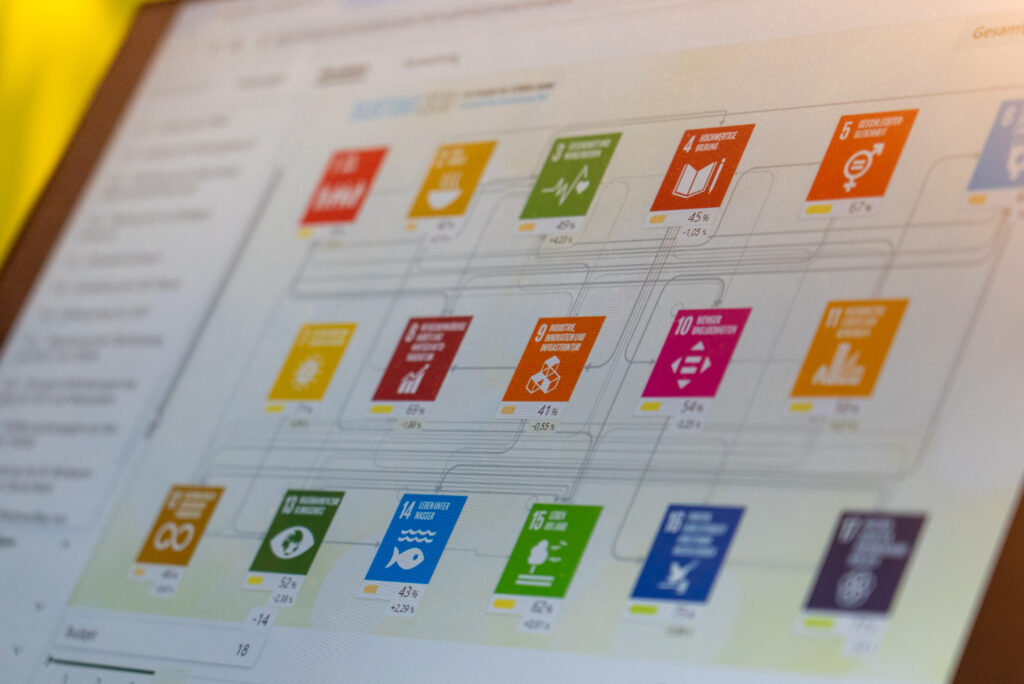

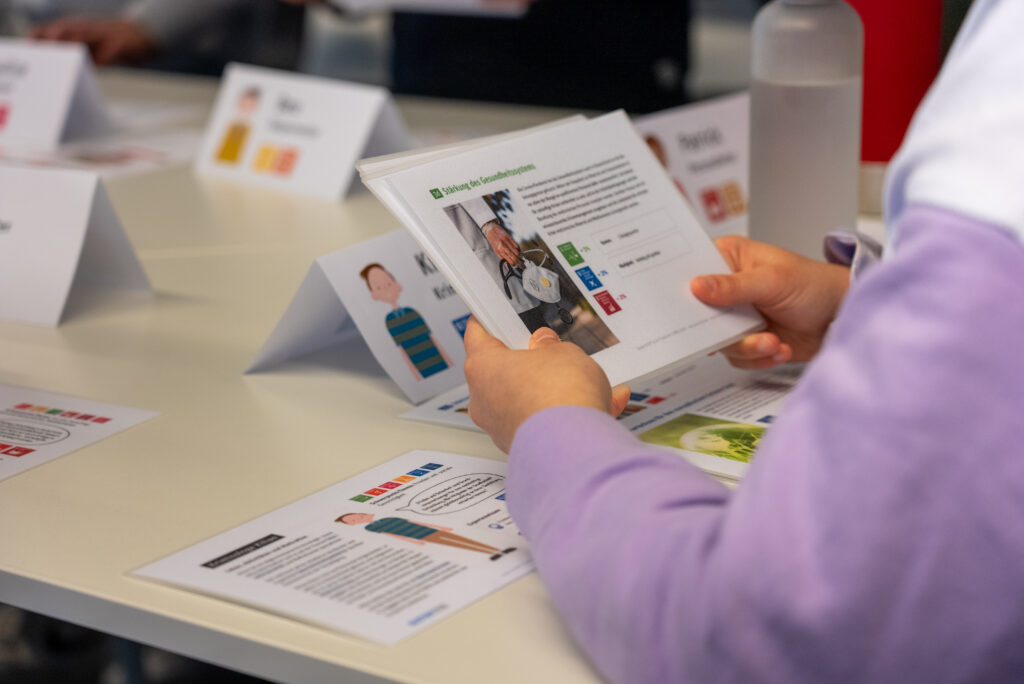

What is the procedure for using the simulation game?
Anja Grabmeier: “The simulation game begins with a welcome and introduction to the SDGs. We then return to the year 2021 by appointing a citizens’ council made up of various representatives from civil society, politics, business and science. The participants each take on a role from whose perspective they act in the simulation. Each role contains measures that can be introduced as actions during the Citizens’ Assembly meetings. The Citizens’ Assembly will meet every six months until 2030 and decide which measures should be taken to promote sustainable development in Germany and achieve the SDGs. At the same time, events such as the coronavirus pandemic will influence the game. After each session, the direct and indirect interactions and dependencies between the SDGs are visualized and how these are influenced by the measures taken. The simulation ends with a debriefing phase for reflection and transfer.”
“Exciting, dynamic, fun and informative. You could understand connections better than if you only learn the SDGs theoretically. I was particularly surprised by the connections between the individual SDGs.”
Participating student regarding the simulation game
How long does the simulation game take?
Manuela Wimmer: “With the introduction and debriefing, around three to four hours should be planned. This also depends on the context in which the simulation game is used, whether the participants are familiar with sustainability and the transfer.
Can other university members also use the simulation game in their lectures?
Anja Grabmeier: “Anyone interested is welcome to contact us or send an email to nachhaltigkeit@hof-university.de. For groups of six people or more, we are happy to organize an internal workshop for facilitator training.”
Are there any further plans for the “Sustain 2030” simulation game?
Manuela Wimmer: “Based on Sustain 2030, we want to develop a simulation game specifically for water management, with the prospect of a sponge city. Water is an essential resource and its sustainable management is of crucial importance.”
Anja Grabmeier: “For this reason, colleagues from the Institute for Sustainable Water Systems were also on board. Afterwards, we reflected on the simulation game together and identified initial starting points for further development.”
Many thanks for the insight into Sustain 2030 and the use of simulation games in courses.





